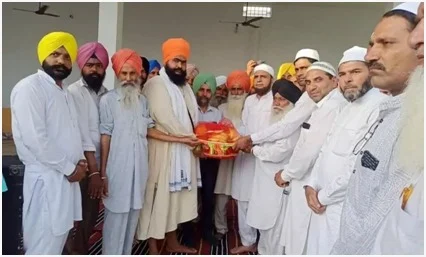In the heart of Punjab’s Malerkotla district, a poignant tale of communal harmony unfolds as Sikhs and Hindus extend warm invitations to their Muslim neighbors for Roza Iftar, breaking fast during the holy month of Ramadan. This unique tradition, emblematic of unity and inclusivity, sees Hindu temples and Gurdwaras opening their doors to host iftar gatherings, reciprocated by Muslims inviting members of diverse faiths to join them in special Ramadan prayers.
Malerkotla, with its significant Muslim population, embraces a culture of inclusivity and solidarity that transcends religious boundaries. The month-long observance of Ramadan and the joyous festivities surrounding it are not confined solely to the Muslim community. Instead, the spirit of camaraderie permeates Hindu temples and Sikh Gurdwaras, where iftar gatherings are organized regularly.
In this erstwhile princely state, communal harmony is deeply ingrained in the fabric of society. Mahant Swaroop Bihari Sharma, president of the All India Brahmin Front, affirms, “We, the Hindus, Muslims, Sikhs, and Christians, have been together for ages in Malerkotla.” Despite attempts by some politicians to stoke division, the residents remain steadfast in their commitment to fostering bonds of friendship and understanding.
Laxmi Narayan Mandir and Aqsa Mosque, situated adjacent to each other in the Hindu-majority Somsons Colony, symbolize the enduring ties that bind the community together. Deepak Sharma, chairman of the Shree Ram Mandir Committee at Ahmedgarh, proudly declares, “We are hosting Roza Iftar at the Ram Mandir, Ahmedgarh, next week for which we have sent invitations to all our Muslim friends.”
Such gestures of solidarity are not limited to urban areas; they extend to the villages as well. Naseer Khan, a prominent community leader, shares that Sikh families, including Gurdwara managements, extend iftar invitations to Muslims in the villages, fostering a sense of unity and brotherhood.
The rich history of Malerkotla, steeped in tales of tolerance and compassion, continues to inspire its residents. Adnan Ali Khan from Malerkotla’s royal family emphasizes the legacy of Nawab Sher Mohammad Khan, whose principled stance against religious intolerance during the reign of Aurangzeb remains etched in the town’s collective memory.
Despite the challenges posed by divisive narratives, the people of Malerkotla remain resolute in their commitment to communal harmony. Amar Singh Sarao, a Sikh businessman and circle president of Shiromani Akali Dal, underscores the importance of fostering goodwill among all communities, transcending political affiliations.
As Malerkotla sets a shining example of unity amidst diversity, its residents reaffirm their collective resolve to uphold the values of tolerance, compassion, and mutual respect. In a world often divided by sectarian strife, Malerkotla stands as a beacon of hope, where the bonds of humanity transcend religious differences.


